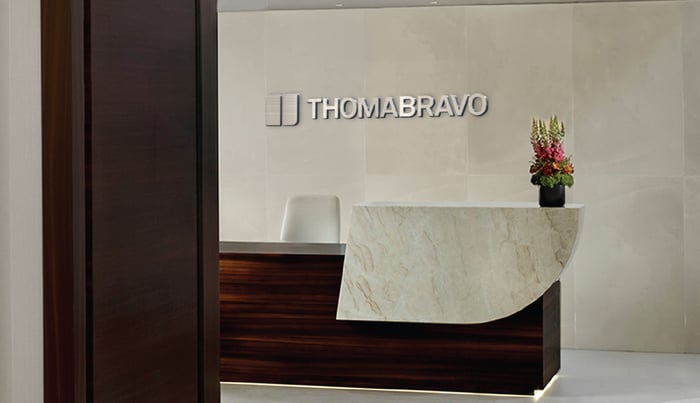

by Michelle F Davis and Liana Baker
October 7, 2022
Tara’s take-outs
Thoma Bravo co-founder Orlando Bravo asked Tara Gadgil, a partner at the private equity firm, last winter how soon she could move to Miami from San Francisco. Her response: “How’s tomorrow?” She had only been to Miami five times before moving there and now compares it to the excitement and dynamism of early Silicon Valley. We chatted with Gadgil about her career and how she helped Thoma Bravo land some of its biggest buyouts of the past few years, RealPage and Anaplan. We also spoke about how to get more women in leadership positions in private equity.
What do you do at Thoma Bravo and how did you get there?
I started my career in investment banking at Goldman in 2007 and switched to private equity right as we were emerging from the financial crisis. Capital was scarce but opportunities were numerous. It was a great time to cut my teeth in the deal world. I joined Thoma Bravo because I started to see a trend towards specialization in private equity. Investors with a differentiated perspective on a sector seemed to be winning processes and generating the highest returns. I decided to start specializing in technology—I was always interested in that because it transcends industries.
My focus areas are vertical markets including health care, real estate and energy, and I also cover a few horizontal areas including office of the CFO, enterprise resource planning and human capital management.
How did Thoma Bravo convince RealPage to sell to it in a $10 billion or so deal? Thoma Bravo had been tracking RealPage for as long as the company has been in existence. Once a year we'd go and have breakfast in Dallas with Steve Winn, the founder and CEO. Every year we’d say, ‘Steve, we would love to invest in your business. We think it's the very best asset out there in real estate technology and we'd love to be a part of it.’ Every year he said, ‘Now's not the time.’
In 2020, we asked again and it was the right time. Steve was looking to find his successor in the business and needed a partner to help promote the legacy that he had created, not only as the founder of this company, but frankly as one of the founders of real estate technology as we know it today.
We were the only ones he was talking to. We negotiated a deal directly with Steve and the board, and we were able to sign and announce that deal right around Christmas 2020.

What about Anaplan?
We’d followed Anaplan since its founding in a barn in York, England, by Michael Gould. It’s the market leader in enterprise-connected planning, which only became more important during the pandemic when companies had to continuously re-forecast their businesses to deal with a constantly changing environment.
We approached the board and the company several times and started a dialogue about how we thought we could help evolve the business to enable it to start growing profitably, which it had never done, and to help it expand geographically.
That really resonated because investors were starting to focus on profitable growth versus growth at all costs. We're in early innings but that message has been really well received by employees and, and frankly I think it's been well received by customers, but time will tell.
What’s your M&A outlook for the next 12 months and when do you see things picking back up?
It’s a turbulent time in the market. The market sell-off actually may intensify in the next couple of months as companies make that transition from the growth-at-all-costs mindset to the profitable-growth mindset. That shift can be really challenging, especially in public markets where you're judged on quarterly results.
Our pipeline is full. We focus on growing profitable software companies and helping them evolve to have more sustainable cash flow profiles. For a public company that needs to make a change, now might be a really good time to partner with an investor like Thoma Bravo that can help it make those operational changes in a private setting.
How is the financing environment impacting the types of deals you consider?
Thoma Bravo is big on the direct funding playbook but even private markets have gotten more expensive.
First and foremost we look at whether we like the company and then we look at what we think we can pay for it. The availability of financing dictates how we're able to think about valuation.
We’re seeing plenty of debt capital available for the highest-quality assets and they might be in different pools of capital than your traditional sort of debt financing pools. We have done a number of deals with direct lenders who are able to do deep diligence and can finance based on what they think the business can achieve from a cash flow perspective.
How can we get more women into tech private equity or private equity in general?
I'm not sure why there are such few women in tech private equity because it's one of the best sectors to be in. Private equity is great for women. It's dynamic, and it enables you to be entrepreneurial in ways that are authentic to you and you alone.
I really see a great shift. I don't think we're all the way there, but when I look at the more junior ranks in private equity, there is much more gender balance than there was when I was in the early stages of my career in private equity.
I'm just seeing really great hope and promise in the more junior ranks, not only at Thoma Bravo, but actually at all private equity firms. The industry really needs to figure out how to make sure that those women are supported and retained because I think the potential is so huge in those women who are just starting out their career.
To read the full article, click here.






